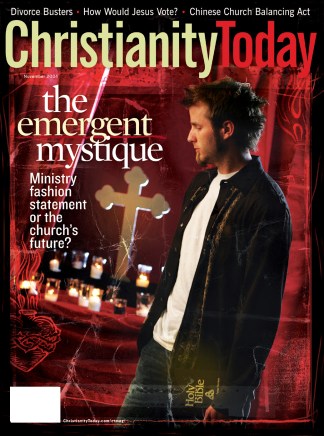The tiny city-state of Singapore is getting smaller. And dangerously so. In the 1970s, when the average number of children per woman was six, Singapore worried about overpopulation, and it launched a “Stop at Two” campaign. That campaign worked so well that the government had to reverse itself. In 1987 it launched a “Have Three or More” policy, but that didn’t work. So the government, which once rewarded parents who had themselves voluntarily sterilized, is now offering paid maternity leaves, thousands of dollars in baby bonuses, and tax breaks for nannies. And according to a Reuters report, the government has now “appointed a ‘population czar’ to reignite the embers of romance in a nation obsessed with cars, cash, and condominiums.”
Nations, from the small to the great, are scratching their heads over falling birthrates. Both developed and developing countries face a demographic dive that threatens their future. Yesterday’s fears of overpopulation now seem quaint, as nations realize they do not have enough younger workers to pay for the social benefits of older citizens. In The Empty Cradle, Phillip Longman reports that “no industrialized nation still produces enough children to sustain its population over time, or to prevent rapid population aging.”
The United States is no longer in depopulation mode, but it too faces a benefits crisis as population aging threatens to create “50 Floridas.” Longman reports that by 2050, the cost of Medicare and Medicaid alone “will consume a larger share of the nation’s income than the entire federal government does today, including the growing cost of interest on the national debt.” Higher taxes on younger workers won’t make up the difference.
Nor will increased immigration make up the difference—in any nation. Immigrants often arrive with their families, and the next generation is likely to adopt the values of an anti-natalist culture. Amazingly, traditional sources of immigration, historically burgeoning populations like those in China, India, and Latin America, are now themselves shrinking.
Reuters says Singapore’s population czar is charged with reigniting the spirit of romance in a society devoted to consumerism. But religion, not romance, holds the key, according to the Howard Center’s Allan Carlson. In a paper prepared for the Family Research Council, Carlson argues that neither free-market nor socialist explanations of falling fertility fit the facts. Secularization, on the other hand, is a good predictor of decreasing fertility. And in sectors where religion is viable, Carlson says, you can expect to see higher birthrates. Longman also takes note of the religion factor, but in a backhanded way. He seems to worry that when the right sort stop having children, it is the “fundamentalists” who still reproduce.
The United States is far less secular than Western Europe, but our outmoded, Nixon-era population policies must be repudiated. We should shift from supporting “family planning services” to “family building strategies.” Indeed, the Bush administration’s much-maligned marriage assistance program is precisely what we need.
But we must also find ways to send broad cultural signals that religiously grounded family systems, not isolated individuals, are the building blocks of a sustainable and healthy society. Pro-natalism must be integrated into the pro-life message, for abortion-on-demand not only kills babies, the cultural context that conceived it starves societies. The new secular order, Carlson points out, masks an inherently negative attitude toward children.
Children and families are an essential part of human well-being. Imagine a society, not far in the future, composed almost entirely of individuals without extended family—no cousins, no aunts or uncles, no siblings. Short-term decisions to forego children may bring immediate economic benefits, but the long-term results impoverish existence.
There is a good reason that the Bible persistently speaks of blessing in terms of family.
Copyright © 2004 Christianity Today. Click for reprint information.
Related Elsewhere:
More Christianity Today articles on birth and family planning include:
Lowering the Baby Boom | A new book helps Christians make wise birth control decisions. (Sept. 03, 2003)
Has Natural Birth Control Been Proved Impossible? | Don’t believe the media reports, cautions the author of Birth Control for Christians. (July 15, 2003)
Make Love and Babies | The contraceptive mentality says children are something to be avoided. We’re not buying it. By Sam and Bethany Torode (Nov. 9, 2001)
‘Be Fruitful and Multiply’ | Is this a command, or a blessing? By Raymond C. Van Leeuwen (Nov. 9, 2001)
Souls on Ice | The costs of in vitro fertilization are moral and spiritual—not just financial (June 24, 2003)
400K and Counting | Christians recoil at explosive growth of frozen human embryos (June 24, 2003)
Books & Culture Corner: More Sex, Fewer Children | Mixed messages on condoms, contraception, and fertility. By John Wilson (Sept. 10, 2001)
How to Make a Person | New reproductive technologies raise difficult moral issues. (Jan. 6, 1997)
Mourning the Morning-After Pill | A Christianity Today Editorial (Apr. 7, 1997)
Charity Defies California Law on Contraception | Court to decide if state can require Catholic ministries to pay for birth control (June 25, 2002)
No Room in the Womb? | Couples with high-risk pregnancies face the ‘selective reduction’ dilemma (dec. 10, 1999)
Hannah’s Sisters | At a Washington Assembly of God, prayers for fertility are answered (Mar. 21, 2002)
Embryo ‘Adoption’ Matches Donors and Would-be Parents | ‘Snowflake’ program is only of its kind in dealing with leftover fertilized eggs (Nov. 2, 1999)
Today’s Christian Woman, a Christianity Today sister publication, also examined natural birth control, and Books & Culture examined whether making love still leads to making babies.
For more current news on fertility and pregnancy, see Yahoo’s full coverage area.










